
Maggie Shi
@maggieshi311
Assistant professor @HarrisPolicy and @NBERpubs, studying public & health economics.
ID: 24963900
https://www.maggie-shi.com 17-03-2009 21:56:32
305 Tweet
1,1K Followers
714 Following


Thrilled to announce the call for the 5th edition of our joint workshop with NBER on Aging and Health, organized with John Skinner, Kosali Simon, and Kathleen McGarry. #EconTwitter

📊 How effective are “soft” spending limits like Medicare’s therapy cap? Join Maggie Shi from Harris Policy on Jan 14 to discuss Medicare’s therapy cap’s impact on spending, targeting, and disparities. Register here: ldi.upenn.edu/events/researc…

Raising hospital payment rates led them to admit more patients while shortening lengths of stay. In the November issue, by Tal Gross (Tal Gross), Adam Sacarny (Adam Sacarny), David Silver, Maggie Shi (Maggie Shi) zurl.co/Occio


Payment incentives alleviate worker shortages at nursing homes. Just Accepted new paper by Ashvin D. Gandhi (Ashvin Gandhi), Andrew Olenski (Andrew Olenski), Krista Ruffini (Krista Ruffini), and Karen Shen zurl.co/H2Uo3


Many industries where the government is a major regulator, purchaser, or supplier suffer from severe worker shortages (e.g., healthcare, transportation, education, public safety). A quick thread on our new The Review of Economics and Statistics (REStat) showing how government payment incentives can help: 1/N


Recessions restrain investments into information technology while expansion policy indirectly stimulates them, from Michael R. Richards, Maggie Shi, and Christopher Whaley nber.org/papers/w33487


Recessions slow IT investments, while expansion policies boost them. In healthcare, downturns limit hospital IT spending, but Medicaid expansion leads to increased investment. Brief by Michael Richards, Maggie Shi (Harris Policy), & Christopher Whaley. ow.ly/N7WG50VHCOz

Medicare spends over $1T per year, so even small cuts to wasteful spending represent huge savings. Maggie Shi and I have a new NBER on a policy targeting *just medically unnecessary physical therapy* and it would have easily have made the Department of Government Efficiency leaderboard. Quick🧵


Placing a "soft" spending limit on physical therapy reduces unnecessary care, but also introduces inequities based on how well providers can navigate paperwork requirements, from Ashvin Gandhi and Maggie Shi nber.org/papers/w33722




Every $1 Medicare spends on monitoring saves $24–29 by deterring unnecessary care. Smart oversight = massive savings + better tech to assess what care is truly needed. Research from Harris Policy's Maggie Shi ow.ly/OVt750W1670 #HealthPolicy #Medicare


Examining the impact of reducing the administrative fragmentation of billing and payment by studying a Medicare reform that consolidated billing processes across service types, from Riley League and Maggie Shi nber.org/papers/w33863



A Medicare reform cut billing fragmentation as planned, but it brought only modest gains in administrative efficiency and no clear impact on patient outcomes or hospital costs. Research by Riley League and Maggie Shi (Harris Policy). ow.ly/KXe450Wn7L2




